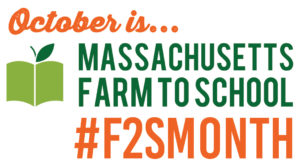For Educators
🍏Sign up for our Harvest of the Month for Educators program (elementary and/or secondary).You will receive a monthly newsletter that features resources focused on the Harvest of the Month crop, including history and fun facts, book suggestions, lesson plans and additional resources.
🍏Connect your school gardens to your classroom curriculum! Can you integrate your school garden into your humanities and STEM lessons? If you need some ideas, visit the Massachusetts Farm to School website for resources for educators of all grade levels!
🍏Make time for social emotional learning and give your students some free time to explore the school garden. Ask them to use all of their senses: what do they see, hear, feel, smell? Here is a Sensory Herb Lesson. If possible, do a taste test in your classroom with a local crop or something grown in the school garden.
🍏Organize a field trip to a local farm, farmers’ market, or food hub. If you can’t leave the campus, you could invite a local farmer to come speak to your students or look for a virtual field trip to a local farm.
🍏Create a bulletin board that celebrates local food and local farms. Assign students topics to research in their own community. Have students identify their own topics that they would like to explore.
🍏Are there issues in your community that your students would like to explore? Facilitate a community needs assessment with your students– what project ideas can they develop around food systems, climate, food waste, food miles, that relate to your own community?
🍏Plant some seeds, and have students examine their growth and change. A sunny windowsill or grow lights can bring some excitement to your classroom.
🍏Ask your students if there is a lot of food wasted in the school cafeteria? Brainstorm ways that your school could decrease food waste. Have students do a food waste audit. Consider starting a school-wide composting program. Learn about a program started by youth in Northampton, MA.
🍏Do your students know what they are eating? Analyze ingredients on packaging. Teach about the food system. The Nourish curriculum offers a rich set of resources to open a meaningful conversation about food and sustainability.
🍏Work with your school librarian to create a Farm to School book section. You can find an extensive book list here.
🍏Collect your students’ favorite traditional recipes. Create a cookbook and cook a meal or snack together. Check out the work of a high school classroom in Lowell– could this lesson be adapted for your classroom?




